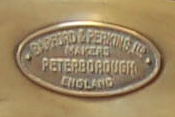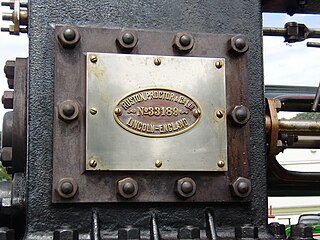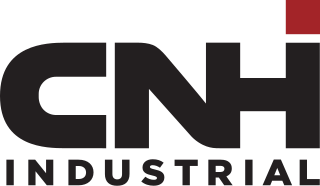Related Research Articles

British Leyland was an automotive engineering and manufacturing conglomerate formed in the United Kingdom in 1968 as British Leyland Motor Corporation Ltd (BLMC), following the merger of Leyland Motors and British Motor Holdings. It was partly nationalised in 1975, when the UK government created a holding company called British Leyland, later renamed BL in 1978. It incorporated much of the British-owned motor vehicle industry, which in 1968 had a 40% share of the UK car market, with its history going back to 1895. Despite containing profitable marques such as Jaguar, Rover, and Land Rover, as well as the best-selling Mini, BLMC had a troubled history, leading to its eventual collapse in 1975 and subsequent part-nationalisation.

Heavy equipment, heavy machinery, earthmovers, construction vehicles, or construction equipment, refers to heavy-duty vehicles specially designed to execute construction tasks, most frequently involving earthwork operations or other large construction tasks. Heavy equipment usually comprises five equipment systems: the implement, traction, structure, power train, and control/information.

A steamroller is a form of road roller – a type of heavy construction machinery used for leveling surfaces, such as roads or airfields – that is powered by a steam engine. The leveling/flattening action is achieved through a combination of the size and weight of the vehicle and the rolls: the smooth wheels and the large cylinder or drum fitted in place of treaded road wheels.

A steam shovel is a large steam-powered excavating machine designed for lifting and moving material such as rock and soil. It is the earliest type of power shovel or excavator. Steam shovels played a major role in public works in the 19th and early 20th century, being key to the construction of railroads and the Panama Canal. The development of simpler, cheaper diesel, gasoline and electric shovels caused steam shovels to fall out of favor in the 1930s.

Marshall, Sons & Co. was a British agricultural machinery manufacturer founded in 1848. The company was based in the Britannia Iron Works, Gainsborough, Lincolnshire. Early production was of steam engines and agricultural machinery. Later production included diesel tractors such as the Field Marshall, Track Marshall and former Leyland wheeled tractors.

Ruston & Hornsby was an industrial equipment manufacturer in Lincoln, England founded in 1918. The company is best known as a manufacturer of narrow and standard gauge diesel locomotives and also of steam shovels. Other products included cars, steam locomotives and a range of internal combustion engines, and later gas turbines. It is now a subsidiary of Siemens.

Aveling and Porter was a British agricultural engine and steamroller manufacturer. Thomas Aveling and Richard Thomas Porter entered into partnership in 1862, and developed a steam engine three years later in 1865. By the early 1900s, the company had become the largest manufacturer of steamrollers in the world. The company used a rampant horse as its logo derived from the White Horse of Kent.

William Foster & Co Ltd was an agricultural machinery company based in Lincoln, Lincolnshire, England often called "Fosters of Lincoln." The company can be traced back to 1846, when William Foster purchased a flour mill in Lincoln. William Foster then proceeded to start small scale manufacturing of mill machinery and threshing machinery. The mill was converted to an iron foundry by 1856, thus becoming the original Wellington Foundry. By 1899 the works had moved to the Wellington foundry in New Boultham and the original works were then occupied by William Rainforth. During the First World War Fosters built some of the first tanks for the British Army.

The Case Corporation was a manufacturer of agricultural machinery and construction equipment. Founded, in 1842, by Jerome Increase Case as the J. I. Case Threshing Machine Company, it operated under that name for most of a century. For another 66 years it was the J. I. Case Company, and was often called simply Case. In the late 19th century, Case was one of America's largest builders of steam engines, producing self-propelled portable engines, traction engines and steam tractors. It was a major producer of threshing machines and other harvesting equipment. The company also produced various machinery for the U.S. military. In the 20th century, Case was among the ten largest builders of farm tractors for many years. In the 1950s its construction equipment line became its primary focus, with agricultural business second.

Richard Hornsby & Sons was an engine and machinery manufacturer in Grantham, Lincolnshire, England from 1828 until 1918. The company was a pioneer in the manufacture of the oil engine developed by Herbert Akroyd Stuart, which was marketed under the Hornsby-Akroyd name. The company developed an early track system for vehicles, selling the patent to Holt & Co. in America. In 1918, Richard Hornsby & Sons became a subsidiary of the neighbouring engineering firm Rustons of Lincoln, to create Ruston & Hornsby.
Aveling-Barford was a large engineering company making road rollers, motorgraders, front loaders, site dumpers, dump trucks and articulated dump trucks in Grantham, England. In its time, it was an internationally known company.

A portable engine is an engine, either a steam engine or an internal combustion engine, that sits in one place while operating, but is portable and thus can be easily moved from one work site to another. Mounted on wheels or skids, it is either towed to the work site or moves there via self-propulsion.

Barford & Perkins were road roller and agricultural machinery manufacturers in Peterborough, England. The original business began in 1840. Their machinery was distributed internationally.

A steam wagon is a steam-powered truck for carrying freight. It was the earliest form of lorry (truck) and came in two basic forms: overtype and undertype, the distinction being the position of the engine relative to the boiler. Manufacturers tended to concentrate on one form or the other.

Clayton & Shuttleworth was an engineering company located at Stamp End Works, Lincoln, Lincolnshire, England. The company was established in 1842 when Nathaniel Clayton (1811–1890) formed a partnership with his brother-in-law, Joseph Shuttleworth (1819–83).

Blackstone & Co. was a farm implement maker at Stamford, Lincolnshire, United Kingdom.

Ruston, Proctor and Company was established in Lincoln, England in 1857, and were manufacturers of steam tractors and engines. They later became Rustons and then Ruston & Hornsby.

CNH Industrial N.V. is an Italian-American multinational corporation with global headquarters in Basildon, United Kingdom, but controlled and mostly owned by the multinational investment company Exor, which in turn is controlled by the Agnelli family. The company is listed on the New York Stock Exchange and on Borsa Italiana: it is a constituent of the FTSE MIB index. The company is incorporated in the Netherlands. The seat of the company is in Amsterdam, Netherlands, with a principal office in London, England.